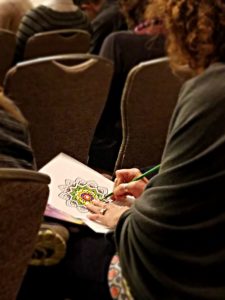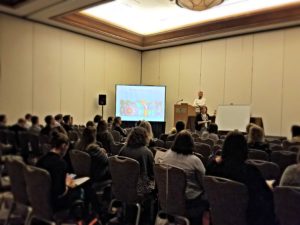By: Tom Jameson, Therapist, & Maureen Sullivan, Therapist
Last week, Pacific Quest (PQ) presented a breakout session at the National Association for Therapeutic Schools and Programs (NATSAP) Conference. Tom Jameson and Maureen Sullivan, both PQ therapists, teamed up to showcase the unique ways in which PQ addresses grief and loss in the context of our lush garden setting. These two seasoned PQ clinicians engaged with their audience in their presentation entitled “The Kaleidoscope of Adolescent Grief: Exploring multifaceted grief experiences in teens.” This is a topic of universal relevance as the human experience includes grieving at various times throughout the lifespan. Maureen says, “As clinicians, we are called upon to walk the journey of grief alongside our students, engage in relationship and give permission to grieve.”

Participant during session
“A fundamental premise to our collaborative presentation was that the grief experience takes many forms, colors and shifts over time: much like the kaleidoscope,” says Tom. “Additionally, grief is differentiated from bereavement in that bereavement refers to the process of recovery after the loss of a loved one while grief refers to any loss.” Tom and Maureen carefully described ways in which adolescents can be in an active grief process due to the loss of innocence, friends, or even movement to a new school or community among other losses. The concept of disenfranchised grief was discussed as being a grief process that is marginalized, overlooked and, often misunderstood. Therefore, the grief process is often overlooked as a clinically relevant issue. Maureen noted, “Naming the grief and giving students an outlet to express grief openly allows for the healing process to begin. If we are open, patient and willing, the grief experience can be a beautiful and healing journey.”
They described how the setting of Pacific Quest affords students a unique opportunity to move through a grief process with the gardens as a living metaphor. In nature, there is constant loss and re-birth, and even the act of composting allows students to experience the cycle of transformation of organic waste into fertile soil. Tom and Maureen described interventions with students using the gardens, rites of passage, ceremony as well as art and sandplay therapy.

Tom Jameson & Maureen Sullivan presenting
Attendees of this presentation expressed that they appreciated the open, participatory presentation style as well as an appreciation for the dynamic and creative interventions PQ uses in addressing grief and loss in this population. Several participants were moved to share their own grief experiences as well as ask questions clarifying the PQ treatment approaches. More specifically, the two cases presented by Tom and Maureen generated a great deal of rich dialogue.
Lastly, each attendee was provided a mandala (very similar to the view inside a kaleidoscope) to “color” the different types of grief that were discussed during the presentation as they experienced them throughout their own lives. All in all, this was a wonderful combination of head, heart and passion for the difficult yet beautiful experience of supporting adolescents through the grief process.